We are starting the column “Freedom in Captivity. Solidarity without Borders”, together with the Belarusian Anarchist Black Cross (ABC), is about imprisoned Belarusian anarchists behind bars. Soon, we will publish articles about their criminal prosecution, views, prison conditions in Belarus, relationships with their loved ones, and ways to help. At the end of each article, there will be a fundraiser to support the prisoners and their families.
Our series opens with the political prisoner and anarchist Mikita Jemialjanaw. Мikita was detained back in October 2019 for attempting to set fire to Detention Centre No. 1 in Minsk as a sign of solidarity with the then imprisoned anarchist Dmitry Polienko. Immediately, he was sentenced to 7 years in prison, on appeal, the term was reduced to 4 years. During his imprisonment, Мikita has faced constant pressure: he was repeatedly placed in pre-trial detention, twice transferred to the prison regime, and added to his sentence allegedly for malicious disobedience to the administration of the penitentiary. His sentence was increased by another two years.
“I believe that in the fight for freedom, justice, and human rights, the end justifies the means.”
Mikita Jemialjanaw’s last word in court
“Even before the events of 2020, Belarusian anarchists were fighting for a free society without oppression and tyranny, organising concerts, taking part in demonstrations, organising marches, and doing charity and direct action actions. Direct action is what sets them apart from the opposition and liberal circles. Direct action begins when peaceful means don’t work. The Belarusian punk band Antiglobalizator had this line: “Terrorism is the voice of an individual driven to madness” – I would replace “terrorism” with “direct action”. Madness begins when corrupt officials rule the country, cops flood the streets, militarism infiltrates kindergartens and schools, the country is ruled by a mad grandfather who gives a machine gun to a minor child, and the voice of dissenters is silenced by violence and prison sentences. It’s easy to drive oneself to madness – a madness of honesty towards oneself and the external world, honesty of thoughts and actions.
In these articles, we will tell the stories of imprisoned Belarusian anarchists who were not afraid to cross the line of fear and show their resilience against the embittered grin of the authoritarian state machine, which has been unpunishedly committing lawlessness in the country for 30 years, demonstrating its rotten, foul, and fearful method of holding onto power“.
Participant in the small media project ‘Not Today, Not Yesterday, Not Tomorrow’
Mikita Jemialjanaw’s mother was separated from her son for six years. He was 19 years old at the time. There are three other children in the family: together with the father, the five of them are the only ones who write letters to Mikita. Below are memories of Jemialjanaw‘s trial, information about his conditions of detention, and unobtrusive tips on what to write to a political prisoner anarchist about.
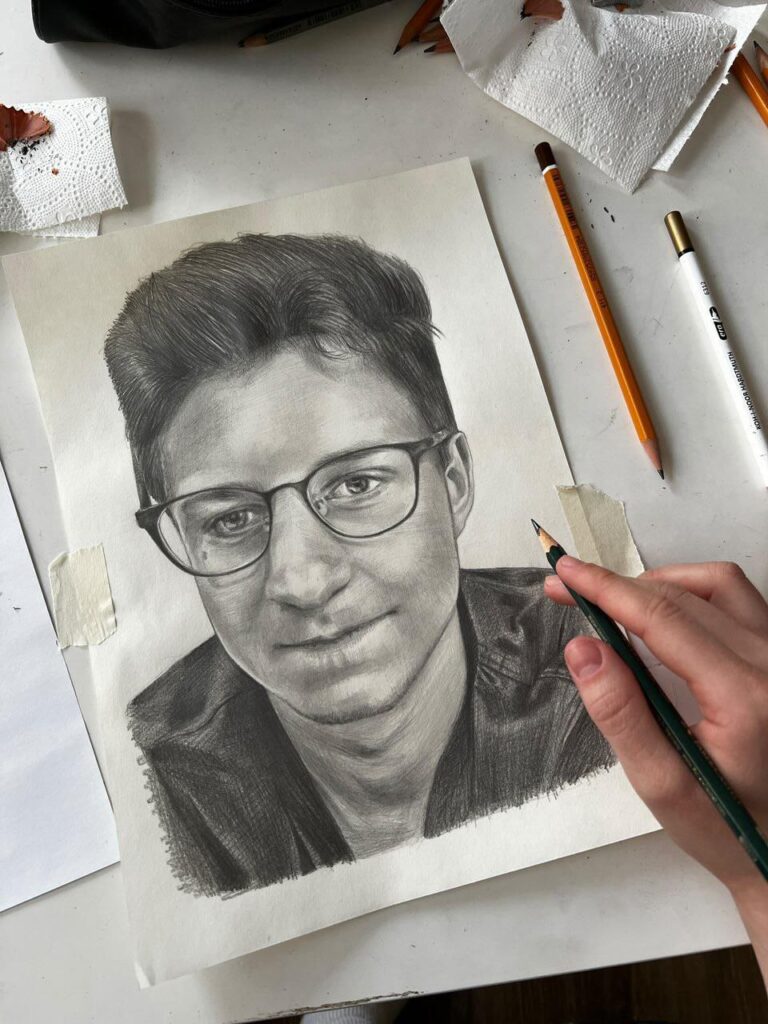
Nastassia Jemialjanava, Мikita’s mother:
Мikita has been behind bars for four and a half years. It is difficult for me to say what he is like now, as I remember him as a teenager. Мikita was captured when he was a third-year student. Now he has changed a lot and become a man.
Of course, we talked about politics at home. Мikita became interested in anarchism around the age of 16. He read books on political science from an early age. Мikita was also interested in history; I think he understood very well what kind of system we have in Belarus by the age of 16. We talked to him: I prefer democracy on the model of Scandinavian countries, while Мikita likes the ideas of anarchism and horizontal communes. We debated, but each of us stayed with our own thoughts.
In March 2022, Mikita Jemialjanaw was convicted under Article 411 (supposedly for disorder) and sent to Volkovysk Colony No. 11 for repeat offenders. Now he is in Grodno Prison. Мikita was repeatedly put in the punishment isolator, he spent 30 to 40 days in jail. He went on hunger strike twice: the first time he refused food and then water. It seems to me that some rights were able to be restored to him because of this, although not all are known.
Religious items were not passed on to Мikita. I tried to bring him prayer rosary, but the woman accepting the items said that only an icon and a cross necklace were allowed. I argued: the list says that you can pass on religious items; there are no restrictions. But who cares? Eventually, a priest passed the rosary to him, but, as Мikita later said, they were confiscated. Additionally, when Мikita was arrested, they took away his medallion with the Virgin Mary.
I have seen my son only a few times from 2019 to 2024. The first time was still in the detention centre, then there was a three-hour visit in 2020, when we came as a family with his brothers and father. Of course, we couldn’t talk about much; Мikita was constantly under surveillance, so it wasn’t really a private meeting.
The last time we saw each other was in the colony in 2022, when we spent three days together. Then I noticed that he had changed: he had grown up, become more courageous, he must have changed his thoughts and views because Мikita had been through both fire and water.
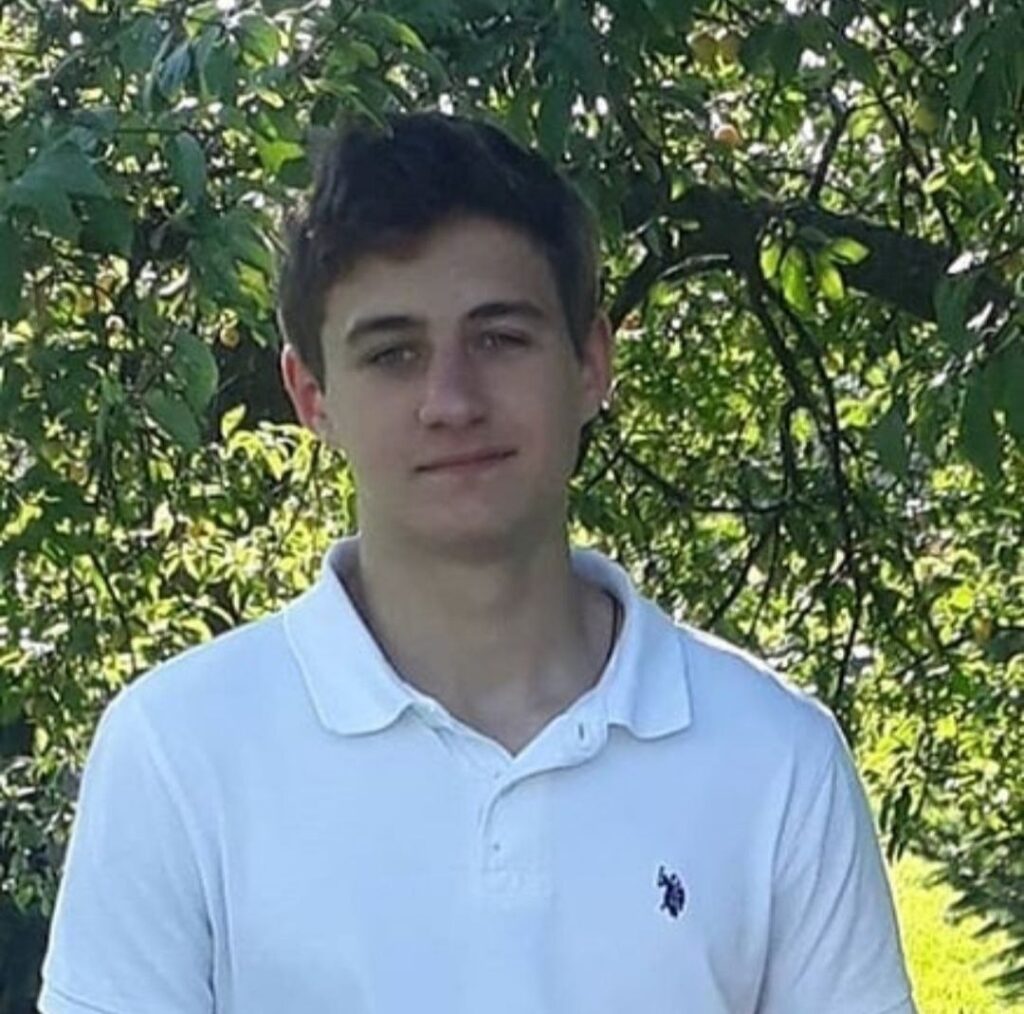

Мikita, August 2018, Photo from the family’s personal archive. Мikita’s letters, photos from Svetlana’s archive
This is what Vasil Bykov wrote about: extreme circumstances, war, prison, captivity, showing who we are and what we are capable of. All human qualities are exposed there. Someone comes out as a hero, someone else does not. Мikita has already changed several colonies. Different people are around him: both political prisoners and other convicts. Of course, this affects him. But I am sure that he is strong.
I attended several court sessions. I remember waving to Мikita to let him know that I loved him and did not judge him for what he had done. I wanted him to feel my support, no matter what: I folded my hands in the shape of a heart, sent air kisses, and smiled at him.
Of course, there was no question of a fair trial. Мikita is a young man with good character references, a man without any offences, clean before the law, and he is immediately given a sentence of 7 years! In my opinion, Мikita didn’t break the law, but made a political action, and wanted to draw attention to the situation with his fellow anarchist Dmitry Polienko. Did he break the law? It should be decided by the court, but there was no court, it was a circus. But his actions are the maximum of hooliganism. In other countries, activists hold performances, actions and get fined. Imagine: some Greta Thunberg gets 7 years – it’s absurd!
Now Мikita only gets letters from his family. I know that other people also write to him, but during the year he received only one letter, not from his relatives. Once in Mahilou prison, Мikita stopped receiving letters because the censors seemed to see a cypher in the smiley faces of his friends. After that, Мikita wrote to me to be more careful when writing, and I had always drawn him a heart and smiley faces. Then I had an idea.
Do you remember how, in my childhood, on contour maps of geography, at the bottom were symbols? So I started to decode: smiley face: ‘funny emotion’, ‘joke’, heart: ‘feeling of love’, ‘I like something’.
Мikita reads a lot behind bars. What else can one do there? Especially when you’ve spent about 12 out of 14 months in ‘solitary confinement’. However, there are problems with this: orders from ‘Belkniga’ don’t always reach him. For example, the last collected order was in the shop for six months, and none of the prison staff came to pick it up. They never explained to us what the matter was.
The more we are alone, the fewer topics for conversation: so we discuss books and films. Мikita asked about movies, and I looked up information about actors and awards for him. One of the films Мikita asked about was ‘Barbie’ and ‘Oppenheimer’. Father and brothers rather on TV series; in this, they are more aware than me. So, we share: someone writes about movies and series; someone writes about books. By the way, Мikita loves historical novels, Hugo, and ‘Harry Potter’. But there’s a problem: his choices are limited to what’s in the prison library. New books are hard to get.
In every letter, we tell Мikita how much we love and wait for him. This is the most important thing for a person behind bars.
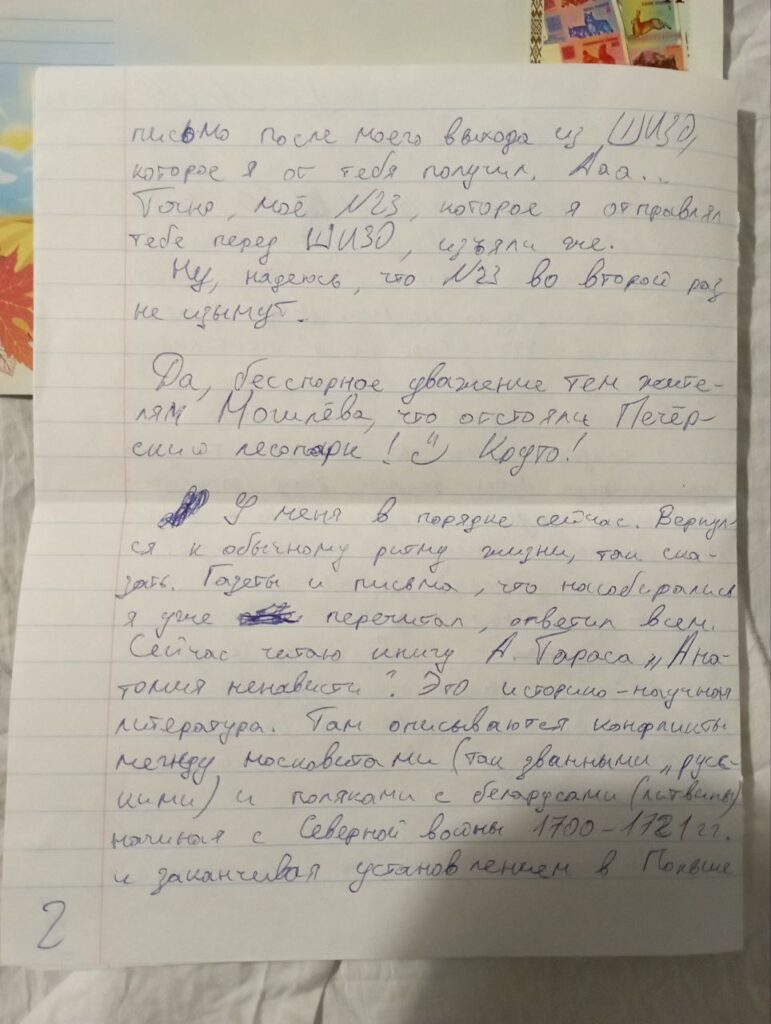
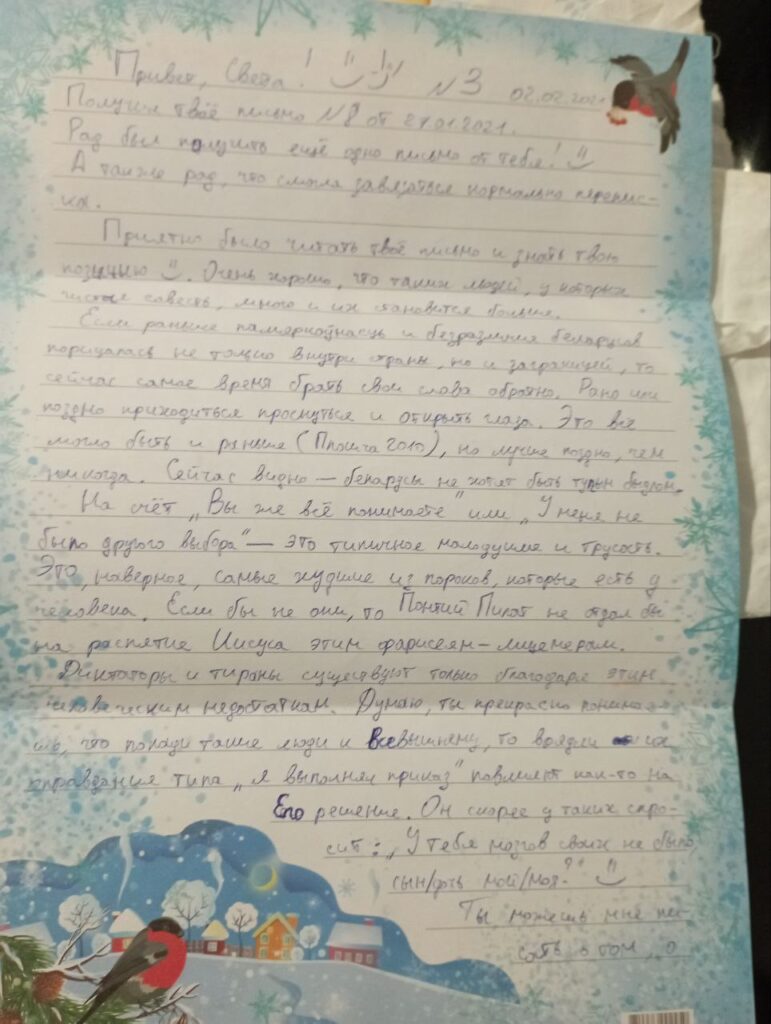
Мikita’s letters, photos from Svetlana’s archive
Svetlana is Мikita’s guardian from Disidentby. She got to know Мikita when he was already in prison, having learned about his story online, after which she decided to take Мikita under her guardianship. You can find out what the task of a guardian is, what Мikita wrote about, and how to help political prisoners by reading the interview below.
Svetlana, Мikita’s friend and protector
We met by correspondence when Мikita was already behind bars. It was his story that touched and amazed me: Мikita was fighting for the rights of political prisoners even before the events of 2020. By the way, one of those whom Мikita supported with his action was soon released.
At the trial, Мikita said that it was not a court, but a shameful trial and that there was no honest and fair trial in the country. This got to me. I started to send him letters. We had a long correspondence until there was a complete blockade of letters.
The role of a guardian is to provide media support. You need to tell the political prisoner’s story on social media, publish his drawings, and write letters.
Nikita often ends up in the punishment cell. The conditions there are terrible. The additional term under the article for disobedience shows that Мikita is under pressure from the prison administration, but he still resists repression.
Мikita is very fond of history; in his letters, he tells me about different historical facts. He advised me about interesting places in Minsk, for example, his favourite Loshitsky Park, near where he lived. I went there, then sent him photos from there. He was very happy.
The last letter I received from Мikita was a couple of months after the full-scale invasion of Ukraine. He congratulated me on the 8th of March, the day of women’s struggle for their rights. Then I wrote a lot, both electronically and simply, but there was no reply. The parcel I wanted to send was not accepted (he has very strict restrictions: one 5-kg parcel per year). If you are on a strict regime, with these yellow tags, you can be deprived of both parcels and calls.
How can democratic forces help political prisoners? I think the exchange method is a good idea. Political prisoners in Belarus are dying behind bars. Yes, there is such a popular opinion that if some are released, others will be imprisoned. It can happen, but at least those who have spent years behind bars will have a chance to recover. Мikita has been imprisoned for 4.5 years, going through the harshest prisons in the country. And if it were possible, I would definitely be in favour of his release. But I don’t believe that politicians will do it beyond words. They could have blocked trade routes a long time ago, made normal sanctions instead of those that affect ordinary people, not the regime. It should be remembered that ordinary people remain in the country, including relatives of political prisoners, who cannot leave.
How can we support political prisoners? Donate to their families in the safest way possible. And preferably not through intermediaries, but directly: look for direct contacts of the families of political prisoners and send parcels (families with many children, for example, need certain things, some need food in general – different requests).
If you are in Belarus and know any political prisoners, just talk to their relatives; it helps them emotionally.
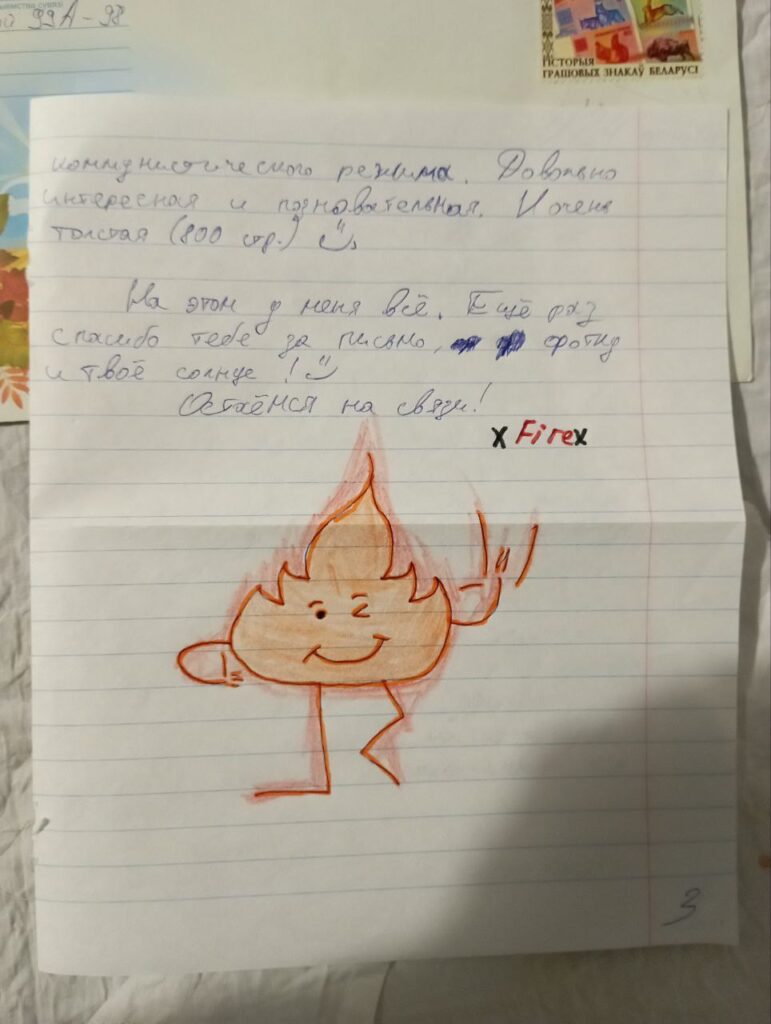
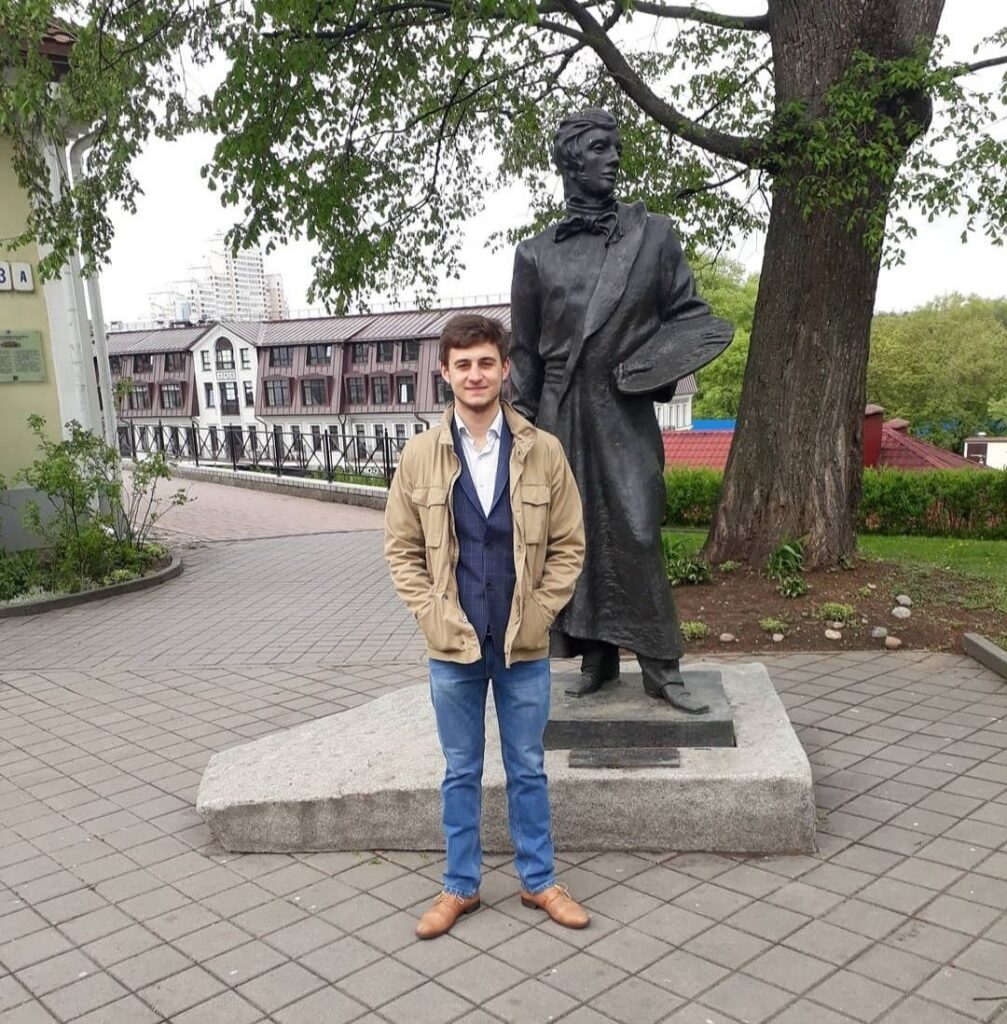
Мikita’s image, photo from Svetlana’s archive. Мikita, May 2019, Photo from the family’s personal archive
This is a story not only about freedom in captivity, honesty, despondency, maximalism, and resistance, but also about great love, which does not obey any system. The building that Мikita tried to set on fire in solidarity with his comrade Dmitry Polienko suffered only material damage. Whether this corresponds to six years in prison for the young man and eight months in solitary confinement is a rhetorical question. This is the response of the police cardboard state to our solidarity and desire for freedom. It is evident that the sentence was given for his civic position, given that Мikita has so far been clean before the law, and his university reputation and reputation as a citizen remain impeccable. But the regime is not embarrassed by this: Мikita is treated as a hardened criminal-recidivist, and repression and brutality in prison towards Мikita and others like him have become the new ‘norm’. He is forced to clean the courtyard for walks, and if the guy doesn’t agree, the answer is always the same: punitive isolation, theft of letters and parcels, refusal to visit the priest, and inability to work (the only non-routine business in the penitentiary). However, despite all the repression, Мikita does not give up, and does not compromise with the prison administration.
You can support Мikita and his family by sending letters online or via the ABC (Anarchist Black Cross Belarus) Belarus and Disidentby platforms; they will be saved and given to the political prisoner after his release. You can also donate by clicking on the links below.
Links:
Learn about Mikita Jemialjanaw’s case and write him a letter


